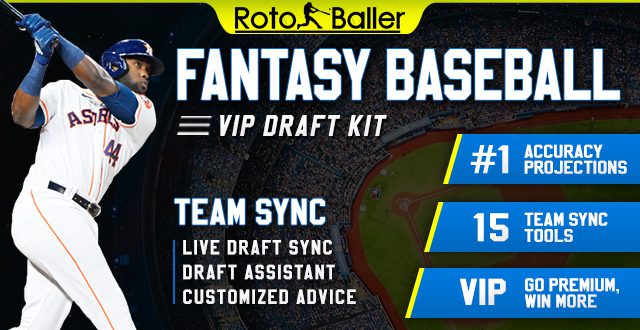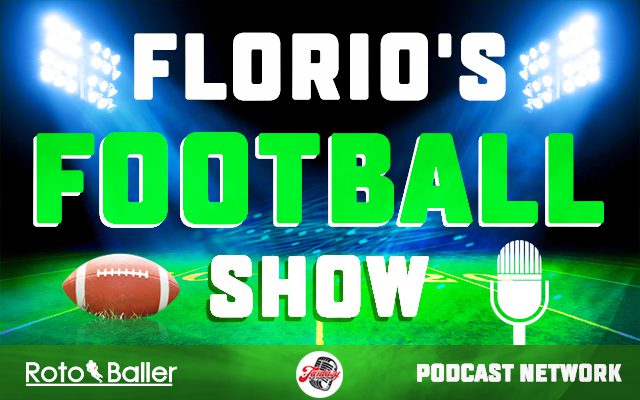The outfield is one of the deepest spots right now in fantasy baseball with names like Ronald Acuna Jr., Victor Robles, and Juan Soto dominating early draft boards for 2019. The minors remain stocked with exciting players, and new talent is still on its way to the Major Leagues, just in time for dynasty and deep-league owners to start tracking and drafting these talents. And yet, it is never too early to pivot to 2020 and beyond with stashes and minor league targets.
What makes this list unique from others so far would be the ages of the players, with most of the Rising Stock players just leaving Rookie ball. The three featured on this list are all players that have jumped up prospect ranks, so while they are a bit of a wait, the payoff will be there for owners. Even if owners are not drafting young players yet, these are names that everyone should want to know and stash for future years in fantasy baseball.
As with all of the RotoBaller dynasty articles, keep reading to find out who the next fantasy stars will be, and who to avoid in upcoming drafts. For owners who need to start shopping players to make room on a roster, take advantage of the early warning on these players and jump ship to grab the next batch of stars.
Be sure to check all of our fantasy baseball lineup tools and resources:- Fantasy baseball trade analyzer
- BvP matchups data (Batter vs. Pitcher)
- PvB matchups data (Pitcher vs. Batter)
- Who should I start? Fantasy baseball comparisons
- Daily MLB starting lineups
- Fantasy baseball closer depth charts
- Fantasy Baseball live scoreboard
- Fantasy baseball injury reports
Stock Rising - Kristian Robinson (OF, ARI)
After entering 2018 as Baseball America’s number 11 prospect in the Diamondbacks system, there are few doubts currently that Robinson might be the top prospect in that system to start 2019. A J2 signing out of the Bahamas, Robinson is an elite athlete with speed to stay in center, and the bat skills to play at any of the corner spots.
During his time at Rookie ball, Robinson splashed the hit tool with a .286/.376/.442 slash line complimented by seven homers and 12 steals in 57 games. Add this to 48 runs, and Robinson showed the ability to impact all five categories, making him a prime roto league prospect. Owners looking at the minor league numbers should not be scared away by the swing and miss, as the walk rate is above his fellow players, and shows that this is a better than average plate approach.
While there are still aspects of the profile to work on, the aggressive swing is what generates his power and high batting average. According to scouts, there is still some projectability here, and while he is only 18 to start the 2019 campaign, the raw skills that led Arizona to drop $2.5 million to sign him are still there. All signs point to a good investment by the Arizona front office, and fantasy owners should follow along.
Stock Rising - Austin Beck (OF, OAK)
The power/speed combo will get any fantasy owner excited, and Beck has shown that so far. After struggling to a .211 batting average at rookie ball in his 41 professional games, Beck rebounded to a .296 batting line at A-Ball. The homers stayed the same at two, but the overall batting profile took the tick up that the team expected when they drafted him sixth overall in 2017.
Some concerns remain to see if the speed can translate to the basepaths, as Beck only posted eight steals in 14 total attempts in 2018. He needs to tap into the 25-plus steal upside to turn into an elite outfielder, but a strong rebound year with the bat should keep owners interested, or at least, get them back on the train after a slow start to pro ball.
Even without the steals, the speed profiles him as a plus defender, so the playing time will not be a question mark once he makes the long journey to the Athletics. While Beck is a long-term prospect, do not be surprised if he starts to move a bit faster due to the raw skills.
Stock Rising - Jhon Torres (OF, STL)
Torres was one of the break-out players of 2018, with a .397/.493/.683 slash in 17 games after a mid-season trade from Cleveland. The extra piece in a trade that sent Oscar Mercado to Cleveland, Torres was the rawest of the players in the deal and still is, but the upside is there for all to see. Due to his age, only 18, he did not appear on prospect lists in 2018 and was not on the fantasy community’s radar until the second half of the campaign.
The current plan seems to be for him to start 2019 at A-Ball meaning that like Beck, this is a long-term stash, but the payoff should be worth it for all formats. There are a few red flags so far though, as he has always been a heavy pull hitter with a 60.5% mark with Cleveland and a 46% mark after the trade. The tools are the selling point with this profile and some trust that the Cardinals can finesse the swing and plate approach to unlock the upside, by keeping the pop but encouraging an all-fields approach.
In fact, the power was the most significant asset with eight homers in 47 games last year. Torres should start entering the back-end of top 100s this season, and owners in dynasty leagues with minor leagues slots, who are willing to wait five years, should begin clearing out a spot for this high-upside outfielder.
Stock Falling - Austin Hays (OF, BAL)
At one point the future of the Baltimore outfield and the foundation of their rebuild, Hays is now on the outside looking in for playing time. Hays entered 2018 as the top prospect in the Orioles system, but after some struggles with Baltimore in 2017, 2018 was a full regression leading to more questions than answers.
During his brief time with the Orioles in 2017, Hays slashed .217/.238/.317 with one homer in 20 games. The promotion was too early for the toolsy outfielder, and the 2018 line shows that. Demoted down to Double-A, he dropped the batting line to .242/.271/.432 with 12 homers and six steals in 66 games. In a vacuum the overall production was decent, but Hays is now a bit old for the level and will turn 24 this season.
There is plenty of time for Hays to return to the heralded prospect that had many excited, but the pull-heavy approach is starting to show some holes. The K rate has jumped with every move up the ladder, and the 20.5% mark was the highest of his career in 2018. Add that to a declining walk rate, all the way down to 4.2%, and this is a free-swinger without the carrying hit tool to set the floor. Owners should be looking to move on while there is still some name value here.
Stock Falling - Blake Rutherford (OF, CWS)
Rutherford is not by any stretch a lost cause, but the upside is waning as the power seems to have left his bat. The former 18th-overall pick in the 2016 draft by the Yankees, Rutherford moved to Chicago in a deadline move in 2017 for Tommy Kahnle, David Robertson, and Todd Frazier.
At the time he was the star of the return and was expected to compliment Eloy Jimenez and the young pitching corp on the South Side. The main concern so far has been the trend towards groundballs, with a 54.4% mark last season. Coupled with a 7.8 HR/FB%, this will limit the power upside as demonstrated by the single-digit homer totals to date. The other concern is that the glove puts him in a corner-spot making the lack of game power harder to handle. And yet, the production still looks appealing, as in 2018 Rutherford slashed .293/.345/.436 with seven homers and 15 steals in 115 games.
He might hit his way into covering the power, but with sub .300 batting averages in the minors, the hit tool is not going to carry the profile to his ceiling. Like Hayes, do not abandon Rutherford, but also do not view him as a top-50 outfielder in fantasy leagues moving forward.
Stock Falling - Leody Taveras (OF, TEX)
Entering the 2018 campaign as Baseball America’s number two prospect in the Rangers system, Taveras had a season to forget. Over 132 games at High-A, the slugger slashed .246/.312/.332 with five homers and 19 steals. These numbers demonstrated little to no improvement from A-Ball and even a decline in the power output.
When the speed was one of the carrying tools, and he was only successful in 19 out of 30 chances, there are real concerns about his instincts on the basepaths to add to the declining offensive numbers. The batted-ball profile is also telling, with a slight increase in his LD%, from 18.3% to 21.7%, but a corresponding decline in his Fly Ball rate, down to 31.4% from 32.8% the year before.
These numbers make Taveras look more like a hit-over-power prospect, and without the steal numbers to carry him, this will be a hard fit in the corner. Taveras is still young for his level with time to recover, but questions are yet to be answered regarding the hit tool and the long-term ability to produce enough to remain an everyday player.
 RADIO
RADIO

























